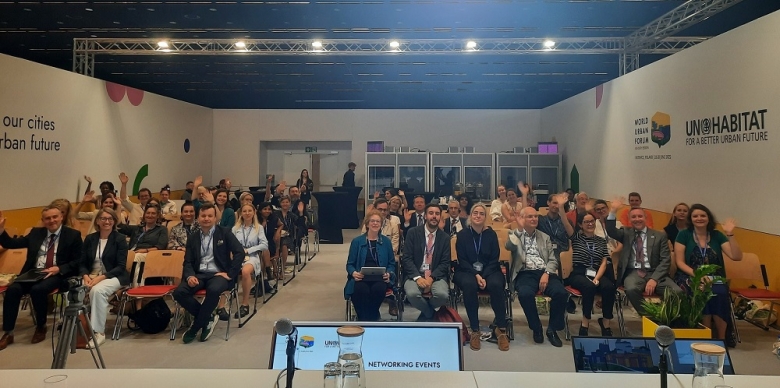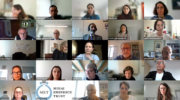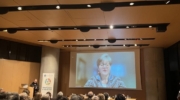Europa Nostra and Climate Heritage Network organise two heritage-related events within the World Urban Forum in Katowice
In its capacity as the Regional Co-Chair of the Climate Heritage Network for Europe and the Commonwealth of Independent States, Europa Nostra contributed to the 11th session of the World Urban Forum held in Katowice, Poland, from 26 to 30 June, with the co-organisation of two heritage-related events. The World Urban Forum (WUF) is the premier global conference on sustainable urbanisation. Under the motto “Transforming our cities for a better urban future”, WUF11 was co-organised by UN-Habitat, Poland’s Ministry of Development Funds and Regional Policy and the Municipal Office of Katowice.

Photo: Europa Nostra
The event “Cities, Culture and Climate: A Get-Together for Green Culture, Heritage and Creative Cities” was hosted by Europa Nostra together with the Climate Heritage Network on 27 June, as part of the WUF11 official programme at the dedicated venue, while a satellite cultural and networking event with the same name was organised on June 29 with Polish and Silesian partners at an industrial heritage site in the city, as an effort to bridge the local, regional, national and international communities.
“Cites+Culture+Climate: A Get-Together for Green Culture, Heritage and Creative Cities” event at WUF11
The event “Cites+Culture+Climate: A Get-Together for Green Culture, Heritage and Creative Cities” was held on 27 June at the WUF11 official venue. It was organised by Europa Nostra and the Climate Heritage Network with the support of ICOMOS, the United Cities and Local Governments Culture Committee and the contribution of two Polish members of the Climate Heritage Network: the Sendzimir Foundation and BoMiasto, a local NGO based in Katowice.
The purpose of the event was to highlight how culture and heritage can help us respond to climate change and transform our cities for a better urban future. It put the spotlight on culture-based approaches that allow us to imagine and realise circular, regenerative, low carbon ways of living not dependent on the exploitation of people and nature – from using traditional knowledge on how we designed and built cities before the fossil fuel era to mobilising artistic and imaginative tools to challenge business-as-usual mindsets.
The event brought together diverse local, European, and international urban changemakers who are driving transformative change through art -, heritage- and culture-based climate solutions. Inspirational speakers included Lorena Aldana, European Policy Coordinator at Europa Nostra; Andrew Potts, Coordinator of the Climate Heritage Network; Sebastian Pypłacz, Vice-President of Biomasto; Ewelina Pekala, Project Coordinator at the Sendzimir Foundation; Katarzyna Piotrowska, Deputy director of the Department of Culture at the City of Krakow; Pablo Fernandez, Chief of Staff of United Cities and Local Governments and Sophia Torres, Policy Officer at the Global Platform for the Right to the City.
In her opening remarks, Lorena Aldana, European Policy Coordinator at Europa Nostra, outlined the organisation’s vision on cultural heritage as a vector and resource for transformative climate action, affirmed by its recent appointment as Regional Co-Chair of the Climate Heritage Network for the wider Europe region. “This is precisely the message of our European Cultural Heritage Green Paper “Putting Europe’s shared heritage at the heart of the European Green Deal” produced by Europa Nostra, ICOMOS and the Climate Heritage Network with the support of the European Investment Bank Institute: cultural heritage is a crucial part of the solution!”
Andrew Potts, Coordinator of the Climate Heritage Network and co-host of the event then took the floor to explain the work and mission of the Climate Heritage Network, a global network whose members are committed to mobilising arts, culture and heritage to address climate change and support communities in achieving the ambitions of the Paris Agreement. “The omission of culture in climate policy is a flaw that needs to be fixed and it needs to be fixed now. How? Cultural actors are the missing ingredient – it is up to us to fill this gap,” he added.
The Local Perspective
Sebastian Pypłacz, Vice-President of Biomasto Association – a local NGO based in Katowice and a member of the Climate Heritage Network – gave an insight to the local perspective of the Heritage4Climate movement and explained his organisation as one born out of a fascination with the city and its people. He emphasised the need to collect best practices, provoke discussions about them and try to implement these ideas in other places, and stressed the importance of fora like this event to do it so.
Ewelina Pekala, Project Coordinator at Sendzimir Foundation, whose mission is to promote sustainable development and the advancement of an eco-conscious society, then shared concrete examples and tools to promote nature-based solutions for better urban futures. She referred to policy instruments – including regulations, programmes, action plans and financial incentives – to support cities in becoming more sustainable and climate resilient.
The City Perspective
Katarzyna Piotrowska, Deputy director of the Department of Culture of the City of Krakow reaffirmed Krakow’s commitment to a heritage- based green transformation: ”Krakow is a World Heritage City which is learning from the past to become as Green as possible” she added.
The Global Perspective
Andrew Potts, Coordinator of the Climate Heritage Network, and Pablo Fernandez, Chief of Staff at UCLG, then gave an update on the UCLG Town Hall Process, a space for dialogue and interaction between different international civil society organisations and the political leadership of the local and regional governments to jointly define global policies. Driven by civil society, the Process allows stakeholders to collaborate around different themes, one of them being climate and culture.
📣 Happening at our #WUF11 event “Cities + Culture + Climate”
♻️”The omission of culture in climate policy is a flaw that needs to be fixed NOW. How? Cultural actors are the missing ingredient” says @AndrewSPotts, coordinator of @ClimateHeritage. pic.twitter.com/FDYB6lXglA
— Europa Nostra (@europanostra) June 27, 2022
Last but not least, Sophia Torres, Policy Officer at the Global Platform for the Right to the City, addressed the need for a “new paradigm for urban development – one that is more inclusive and democratic” and the way culture can contribute to achieve this goal.
After the series of short inspirational speakers, the event participants broke into groups to establish meaningful dialogue and impactful networking. The event provided a convivial, informal and inspiring space for private and public actors active in the fields of culture, cultural heritage and creative industries who are leading transformational climate action at city level to meet, exchange and network. Ultimately, the event aimed at fostering synergies, inspire collaborations and initiate partnerships for a greener, more inclusive and more sustainable urban future through arts, heritage and culture.
Satellite cultural and networking event “Cites+Culture+Climate: A Get-Together for Green Culture, Heritage and Creative Cities”
The satellite cultural and networking event “Cities, Culture and Climate: A Get-Together for Green Culture, Heritage and Creative Cities” was organised by Europa Nostra and the Climate Heritage Network in partnership with two Polish CHN members, the Sendzimir foundation and BoMiasto, on 29 June at Galeria Szyb Wilson in Katowice. The venue has a most symbolic one: a post-industrial building repurposed as a cultural and startup centre. The networking event consisted of a reception sponsored by Europa Nostra and a series of talks where the main messages of the Heritage4Climate movement presented at the WUF11 were conveyed to a local audience. Among the questions addressed were: How can heritage from the fossil fuel era help us advance the green transformation? How to mobilise arts & culture to imagine & realise a post- carbon future? What can we learn from the culture-led transformation of former industrial areas like Silesia, hosting the WUF11?
The satellite event gathered Climate NGOs active at local, regional and national level, representatives of the ecological arts movement in Katowice and Silesia, as well as international guests and delegates from WUF11.
Inspiring #WUFinTheCity event “Cities+Culture+Climate” w/ @ClimateHeritage @bomiasto & @SendzimirPL
📍Szyb Wilson Gallery former coal mine
Discussing the🔑 role of heritage for climate action
❗ecoarts & heritage interpretation for a greener future
🤝bridging local/international pic.twitter.com/j9H9ojQp6u— Europa Nostra (@europanostra) June 29, 2022
About Europa Nostra and the Climate Heritage Network
In its stimulating role as Climate Heritage Network Co-chair for the wider Europe, Europa Nostra acts as Europe’s regional spokesperson for the CHN, representing the Members and promoting its collective vision and goals. Ensuring the presence of the cultural heritage movement for climate and sustainability at the WUF11 in Katowice was part of these efforts, with the next important challenge being the COP27 in Egypt.
Europa Nostra looks forward to strengthening the presence of the CHN in Europe, supporting its growth by recruiting new and valuable members, and creating positive synergies between the CHN and EU Institutions and other key heritage stakeholders.






